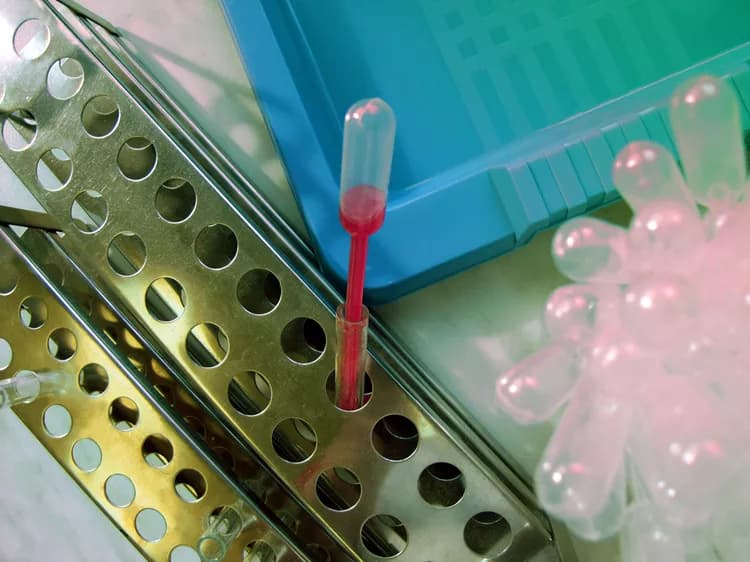What are the other Names for this Test? (Equivalent Terms)
- Factor I Test
- Functional Fibrinogen Test
- Serum Fibrinogen Test
What is Fibrinogen Blood Test? (Background Information)
- Fibrinogen (Factor I) is a protein present in blood that is produced by the liver. It helps in clotting of blood
- Whenever there is any tissue damage or injury of a vessel wall, a protective mechanism called hemostasis, sets in to stop the bleeding. This involves certain cells, called platelets and proteins, called coagulation factors
- A “coagulation cascade” is set into motion, wherein the coagulation factors are activated in sequence, which finally culminate in the conversion of soluble fibrinogen into insoluble fibrin that cross links to form a meshwork, thereby helping to contain the bleeding. The conversion of fibrinogen to fibrin is carried out by a protein, called thrombin
- Fibrinogen Blood Testing is performed, to evaluate disorders of coagulation - which may be any bleeding or any thrombosis (blood clot related), to investigate further into abnormal tests of PT (prothrombin time) and PTT (partial thromboplastin time) that are other coagulation tests, or sometimes, to evaluate the risk of any cardiovascular disease
- Fibrinogen Activity assesses the time taken for the conversion of fibrinogen to fibrin. If it is prolonged, then it may be either due to low fibrinogen levels, or dysfunctional fibrinogen
- A Fibrinogen Antigen Testing helps in quantifying the amount of soluble fibrinogen present and uses antibodies (proteins that react with antigens), to factor I
What are the Clinical Indications for performing the Fibrinogen Blood Test?
Indications for Fibrinogen Blood Testing include:
- Symptoms suggestive of a coagulation disorder - either bleeding (from body sites, or from bleeding spots on skin, or easy bruising), or formation of blood clots
- Abnormal prothrombin time (PT), or partial thromboplastin time (PTT), test results
- Symptoms suggestive of disseminated intravascular coagulation (DIC), such as low blood pressure, bleeding spots on skin and other sites, with low blood counts and low platelets
- Monitor a progressive condition over time, such as liver disease, that affects clotting ability
- Sometimes, in order to assess an individual’s risk for developing cardiovascular disease
- In evaluating individuals for inherited clotting disorders
How is the Specimen Collected for Fibrinogen Blood Test?
Sample required: Blood
Process:
- In adults – a blood sample is drawn through a needle inserted into the vein (arm)
- In young children – a blood sample is drawn after making a small prick on the finger tip
Preparation required: None
What is the Significance of the Fibrinogen Blood Test Result?
- If the Fibrinogen Activity Test is normal, then it usually indicates normal blood clotting. A reduced activity may be due to low fibrinogen levels, or due to fibrinogen that is dysfunctional
- A Fibrinogen Antigen Testing helps in quantifying the amount of fibrinogen present. The normal values of fibrinogen, called the reference range for fibrinogen, may vary slightly from lab to lab. Hence, most lab reports come with a reference range, which is used at that particular center. One such reference range of normal fibrinogen value, in wide use, is 200-400 mg/dL (milligrams per deciliter)
- Low levels of fibrinogen may be due to:
- Inherited disorders of production - afibrinogenemia or hypofibrinogenemia
- End-stage liver disease
- Disseminated intravascular coagulation
- Abnormal fibrinolysis (destruction of the protein)
- A very recent, large volume blood transfusion
- Use of drugs, such as streptokinase, urokinase, anabolic steroids, phenobarbital, and valproic acid
- Decreased fibrinogen levels indicate, an inability to form stable blood clots
- Elevated fibrinogen levels indicate, an increased risk of clot formation and thus cardiovascular disease development
The laboratory test results are NOT to be interpreted as results of a "stand-alone" test. The test results have to be interpreted after correlating with suitable clinical findings and additional supplemental tests/information. Your healthcare providers will explain the meaning of your tests results, based on the overall clinical scenario.
Additional and Relevant Useful Information:
Fibrinogen is an acute phase reactant and hence, inflammatory conditions increase fibrinogen levels. Increased fibrinogen levels may be found with:
- Acute infections
- Stroke
- Cancer
- Trauma
- Rheumatoid arthritis
- Pregnancy
- Smoking
- Oral contraceptive use
Certain medications that you may be currently taking may influence the outcome of the test. Hence, it is important to inform your healthcare provider, the complete list of medications (including any herbal supplements) you are currently taking. This will help the healthcare provider interpret your test results more accurately and avoid unnecessary chances of a misdiagnosis.
Please visit our Laboratory Procedures Center for more physician-approved health information:
http://www.dovemed.com/common-procedures/procedures-laboratory/
Related Articles
Test Your Knowledge
Asked by users
Related Centers
Related Specialties
Related Physicians
Related Procedures
Related Resources
Join DoveHubs
and connect with fellow professionals


0 Comments
Please log in to post a comment.